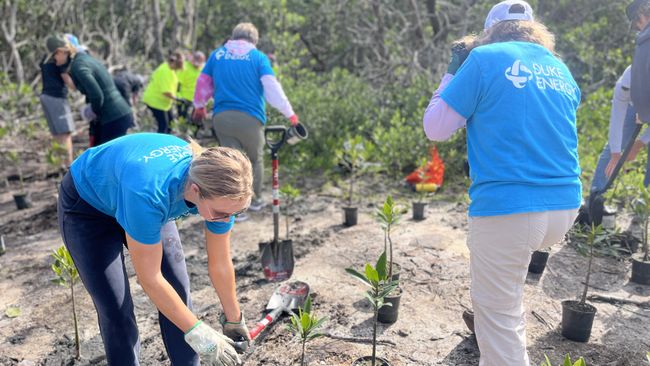Duke Energy, Coastal Conservation Association Florida Plant 500 Mangroves at State Park Devastated by Hurricane Ian
- None.
- None.
ST. PETERSBURG, FL / ACCESSWIRE / January 5, 2024 / Delnor-Wiggins Pass State Park, a popular destination with one of the most pristine stretches of beaches in Naples, is getting a much-needed mangrove makeover to restore portions of its shoreline affected by Hurricane Ian.
More than 25 volunteers from Duke Energy Florida, Coastal Conservation Association (CCA) Florida, as well as special help from Lee County Electric Cooperative (LCEC), teamed up to lead the restoration by planting 500 red and black mangroves across a 4,400-square-foot portion of the park.
The mangroves were grown and donated by the Duke Energy Crystal River Mariculture Center, a company-owned-and-operated fish hatchery dedicated to environmental conservation, and CCA Florida. Additionally, Sunshine Ace Hardware, a local hardware store, donated shovels to aid in the restoration project.
Florida's mangrove ecosystems serve a vital role in the overall health of the state's coastal estuaries. Mangroves reduce coastal erosion caused by storm surges and improve water quality by absorbing excess nutrients like nitrogen and phosphorus. Mangrove soils and roots also sequester carbon dioxide while providing habitat and refuge to a wide variety of fish and wildlife.
While the park is outside of Duke Energy Florida's service territory, this is not the first time the company has joined restoration efforts in southwest Florida.
Three days after Hurricane Ian exited the state, Duke Energy Florida wrapped up restoration of approximately 1 million customers and immediately deployed more than 500 Duke Energy workers and contractors from across the country to help restore power alongside LCEC in Cape Coral and Pine Island.
"As a company, our work doesn't end when the restoration ends," said Melissa Seixas, Duke Energy Florida state president. "The relationships we made with LCEC and the entire community during this response were unforgettable. We are proud to be back in southwest Florida, helping to restore this important habitat with assistance from CCA Florida."
As of May 2023, portions of Delnor-Wiggins State Park reopened to the public for limited use and activities; however, some areas remain closed, including the location where the planting took place this afternoon.
More than 30 years ago, the Duke Energy Crystal River Mariculture Center started as an environmental compliance requirement to operate nearby power plants and has since grown into one of Florida's most successful fish hatcheries and conservation allies.
Instead of shutting down the operation when the power plants closed and the environmental requirement was no longer necessary, Eric Latimer, Duke Energy Florida's manager of the Mariculture Center, found ways to work with nonprofits, universities and state agencies, like CCA Florida, among others, to rebuild and maintain Florida's fish populations and habitats that were being impacted by declining water quality and disasters such as red tide and hurricanes.
"The work that is being done today by Eric and the team at the Mariculture Center will have an incredible, lasting impact on Florida's coastal estuaries," said Brian Gorski, CCA Florida's executive director. "Florida's fisheries would drastically decline without healthy mangrove populations and we thank Duke Energy for their unwavering commitment to the conservation of Florida's marine resources."
To date, the Mariculture Center, with help from CCA Florida, has released nearly 5 million fish and crustaceans along Florida's coasts and has donated approximately
For more information about the Duke Energy Crystal River Mariculture Center, click here.
Duke Energy Florida
Duke Energy Florida, a subsidiary of Duke Energy, owns 10,500 megawatts of energy capacity, supplying electricity to 1.9 million residential, commercial and industrial customers across a 13,000-square-mile service area in Florida.
About CCA Florida
The Coastal Conservation Association (CCA) was founded in 1977 after drastic commercial overfishing along the Texas coast decimated redfish and speckled trout populations. One of 19 state chapters, CCA Florida became the fifth state chapter in 1985. A 501(c)3 non-profit, the purpose of CCA is to advise and educate the public on conservation of marine resources. Through habitat restoration projects, water quality initiatives and fisheries advocacy, CCA Florida works with its over 18,000 members including recreational anglers and outdoor enthusiasts to conserve and enhance marine resources and coastal environments. Join the conversation on Facebook or learn more at ccaflorida.org.
Duke Energy media contact: Audrey Stasko
Media line: 800.559.3853
Twitter: @DE_AudreyS
Coastal Conservation Association Florida media contact: Mary Hillyer Peelen Walther
Phone: 407.617.0604
Email: mhpwalther@ccaflorida.org
View original content here.

View additional multimedia and more ESG storytelling from Duke Energy on 3blmedia.com.
Contact Info:
Spokesperson: Duke Energy
Website: https://www.3blmedia.com/profiles/duke-energy
Email: info@3blmedia.com
SOURCE: Duke Energy
View the original press release on accesswire.com
FAQ
Who is restoring mangrove ecosystems in Delnor-Wiggins State Park?
What is the purpose of the restoration project in Delnor-Wiggins State Park?
How many volunteers and organizations are involved in the restoration project?
What is the contribution of Duke Energy Florida's Mariculture Center to the restoration project?







